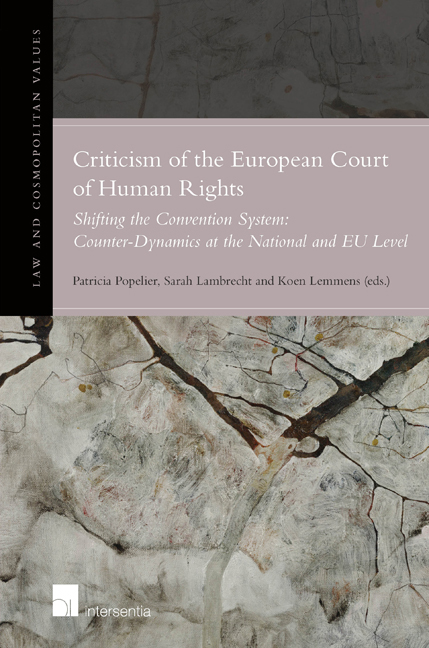 Criticism of the European Court of Human Rights
Criticism of the European Court of Human Rights from PART II - SPARSE CRITICISM
Published online by Cambridge University Press: 13 December 2017
CRITICISM OF THE EUROPEAN COURT OF HUMAN RIGHTS
Any narrative addressing the acceptance of the European Court by Czech society would be incomplete should it start with the present. Attitudes to the Convention started to take shape in Czech scholarly circles in the 1950s, almost entirely informed by the socialist doctrine of international law. This placed heavy emphasis on state sovereignty and non-intervention. It was considered that the notion of the individual as a separate subject of international law would give “imperialist” countries a means to circumvent the sovereign power of weaker countries, legalising interference in their internal affairs. By this logic, recognition of the international legal personality of an international organisation was considered a step towards the hegemony of the most powerful imperialist states. This approach towards international human rights obligations and the supervisory power of international organisations explains the Czechoslovak government's reluctance to submit itself to international human rights regimes. In this respect, UN human rights treaties differ from the Convention in that they do not automatically allow for independent review of State Party compliance in individual matters; separate government consent is needed. Guided by this reasoning, Czechoslovakia did ratify major UN human rights treaties while the government refused to recognise the competence of UN treaty bodies to receive and consider communications from individuals. At the same time, no Soviet bloc country ratified the Convention, as its substantive human rights obligations were interconnected with submission to the control mechanism of the Commission and the Court.
During the short period of political liberalisation in Czechoslovakia in the late 1960s, some scholars became more receptive to the notion of individuals as subjects of international law; the Convention was even recognised as the most significant human rights treaty. Yet this profound ideological shift proved as short-lived as the “Prague Spring”.
The situation changed dramatically after the fall of the Berlin Wall. The Velvet Revolution was a true human rights revolution. In 1990, parliamentary acts on freedom of assembly, on association, on petitions and on private property were immediately adopted. In a speech delivered before the Parliamentary Assembly of the Council of Europe in May 1990, President Václav Havel praised the openness of the Council of Europe, together with its criteria for the admission of new states, and voiced his desire for a unified Europe.
To save this book to your Kindle, first ensure [email protected] is added to your Approved Personal Document E-mail List under your Personal Document Settings on the Manage Your Content and Devices page of your Amazon account. Then enter the ‘name’ part of your Kindle email address below. Find out more about saving to your Kindle.
Note you can select to save to either the @free.kindle.com or @kindle.com variations. ‘@free.kindle.com’ emails are free but can only be saved to your device when it is connected to wi-fi. ‘@kindle.com’ emails can be delivered even when you are not connected to wi-fi, but note that service fees apply.
Find out more about the Kindle Personal Document Service.
To save content items to your account, please confirm that you agree to abide by our usage policies. If this is the first time you use this feature, you will be asked to authorise Cambridge Core to connect with your account. Find out more about saving content to Dropbox.
To save content items to your account, please confirm that you agree to abide by our usage policies. If this is the first time you use this feature, you will be asked to authorise Cambridge Core to connect with your account. Find out more about saving content to Google Drive.